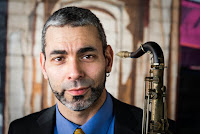 "Down a Rabbit Hole" (Summit Records) is Ms. Inserto's fourth recording and the third to feature her large ensemble with Garzone as a guest soloist - her 2014 album "Home Away From Home" was recorded in Italy with Massimo Morganti & The Colours Jazz Orchestra. Besides Garzone, guest artists on the new album feature trombonist John Fedchock and trumpeter Sean Jones. Over the course of her recordings, she has successfully incorporated the ideas and teachings that Professor Brookmeyer provided and created her own large ensemble sound.
"Down a Rabbit Hole" (Summit Records) is Ms. Inserto's fourth recording and the third to feature her large ensemble with Garzone as a guest soloist - her 2014 album "Home Away From Home" was recorded in Italy with Massimo Morganti & The Colours Jazz Orchestra. Besides Garzone, guest artists on the new album feature trombonist John Fedchock and trumpeter Sean Jones. Over the course of her recordings, she has successfully incorporated the ideas and teachings that Professor Brookmeyer provided and created her own large ensemble sound. What you do hear on "...Rabbit Hole" is a delightful sense of playfulness, freedom, and intelligent interactions. This is music that is not beholden to one sound. Every piece stands out with splendid section writing, excellent solos, and a rhythm section that is supportive not intrusive, powerful without being overwhelming (special kudos go to pianist Jason Yeager, bassist Sean Farias, and drummer Austin McMahon). Highlights include the sprightly opening track, Ms. Inserto's "Three and Me." The "Three" in the title might allude to the guest soloists on the recording, all of whom get to play the melody plus take short yet fine solos. The arrangement sets up each solo nicely with the sections providing a melodic conversation with counterpoint and harmonies while McMahon's drums strut happily below.
The title track rushes in like Alice in Wonderland's March Hare, in a hurry and not settling down. The song has an irresistible groove that along with a sly melody. Tenor saxophonist Garzone, with the urging of the rhythm section, digs into a delightful solo that often moves from "composed" to "frantic" in a heartbeat. Fedchock stands out on the sweet ballad "Mister and Dudley", first when he introduces the delightful melody and then on his sweet solo which has a lovely singing quality. Jones contributes "BJ's Tune" (one of two tracks in the eight-song program that were not composed by Ms. Inserto) - it's also on the slower side but opens up as the sections work through the arrangement of the melody. The composer steps out as the lone soloist with the sections "coloring" the backgrounds as he steps lively in and around the reeds and brass.
 |
| Photo: Steve Provizer |
"Down a Rabbit Hole" is a delight from start to finish. You'll hear a trace of Bob Brookmeyer, a dollop of Thad Jones, and a very generous portion of Ayn Inserto. This album made me smile as the music satisfied my soul! Listen closely and enjoy!!
Enjoy "Part I: Ze Teach" (with its sly reference to Quincy Jones):
Personnel:
Ayn Inserto, conductor/composer/arranger
Guests: John Fedchock, trombone; George Garzone, tenor sax; Sean Jones, trumpet
Allan Chase, soprano/alto sax; Rick Stone, alto sax/flute/clarinet; Kelly Roberge, tenor sax/clarinet; Mark Zaleski, tenor sax/clarinet; Kathy Olson, bari sax/bass clarinet
Trumpets: Jeff Claassen, Bijon Watson, Dan Rosenthal, Matthew Small
Trombones: Randy Pingrey, Chris Gagne, Garo Saraydarian; Bass Trombone: Jennifer Wharton
Eric Hofbauer, guitar; Jason Yeager, piano; Sean Farias, bass; Austin McMahon, drums
Mike Tomasiak, tenor saxophone, Jerry Sabatini, trumpet, and Jamie Kember, bass trombone, on "Part I: Ze Teach" only.
Saxophonist, composer, and arranger Felipe Salles, a native of São Paulo, Brazil, has been performing and teaching in the United States since 1995. A 1998 graduate of the New England Conservatory of Music with a Doctorate from the Manhattan School of Music (2005), he is currently Associate Professor of Jazz and African-American Studies at the University of Massachusetts/Amherst. Salles has worked and/or recorded with artists such as trumpeter Randy Brecker, guitarist Lionel Loueke, vocalist Luciana Souza, and fellow saxophonist David Liebman. He has been the recipient of numerous grants for composition including becoming a Guggenheim Foundation Composition Fellow in 2018. Sales has recorded seven albums as a leader (plus one as co-leader), two initially released in Brazil, two on Fresh Sound New Talent, and three on Tapestry Records.

His third for Tapestry is his first with the Felipe Salles Interconnections Ensemble, an 18-member group he assembled to play his original works that blend classical elements with modern Latin American rhythms. The debut recording, "The Lullaby Project (and Other Works for Large Ensemble)", features two long pieces; the five-movement title track and "Three Tango-Inspired Pieces for Large Jazz Ensemble". The "Lullabies" are inspired by traditional Brazilian lullabies and the composer's mission "is to create a musical commentary on the dark underlying qualities of lullabies, as well as to illustrate the socially transformative impact (they) have had on generations of children."
Not sure if that prepares the listener for the brilliance of these pieces, the excellent arrangements, the intelligent solos, and the power of the ensemble. Through-composed, the individual movements take time to introduce the melody, the brass and reeds sharing phrases while the five-man rhythm section (piano, guitar, vibraphone, bass, and drums) create the tension and the urgency in many of the movements. Throughout the work, the arrangements for the reeds and brass stand out on each "Lullaby". The individual songs have solos: highlights include Angel Subero's bombastic (even elephantine) bass trombone spot on "Lullaby #2" (still listen to the beautiful writing for the reeds) as well as the powerful yet melodic baritone sax solo from Tyler Burchfield on "Lullaby #4." Salles's utilization of multiple flutes, clarinet, and vibraphone create such a stunning background on "..#4" right before Eric Smith's fine trumpet solo and during it as well. Nando Michelin plays both piano and melodica on "Lullaby #5" - his piano spot spreads out over the handsome section work building in intensity spurred on by drummer Bertram Lehmann followed by an equally fine solo from alto saxophonist Jonathan Ball.
The "Three Tango-Inspired Pieces..." follow and each has its own charm and power. The Brazilian Salles has long been charmed by Argentinean and he channels that charm in these compositions. He writes in the liner notes how inspired he was/is by composers like Astor Piazzolla yet one could argue that the arrangements also show, at times, the inspiration of Carla Bley and Guillermo Klein. "Odd Tango" introduces the tension that the rhythm creates for the dancers yet smoothly moves forward on the strength of its melody and solos by Mike Claudill (tenor sax) and Dan Hendrix (trombone). "Astor Square" is dedicated to the modern master. The underlying rhythms, while inspired by the art form, are, at times, looser but note the instant shifts in emphasis and tension. The album closes with "Carla's Tango". The afore-mentioned Ms. Bley is not mentioned as an influence but the piece would not sound out-of-place performed by the Liberation Music Orchestra, the last Charlie Haden's big band that she writes and arranges for. It's the only piece on the album where Salles plays, his soprano saxophone playing both the melody and a delightful solo.
 |
| Photo: Steve Schneider |
For more information, go to www.sallesjazz.com/InterconnectionsEnsemble.html.
Here's the opening track:
Personnel:
Felipe Salles - Conductor, Composer, Arranger, and soprano saxophone on "Carla's Tango"
Richard Garcia, alto sax, soprano sax, flute
Jonathan Ball, alto sax, soprano sax, flute
Mike Caudill, tenor sax, soprano sax, clarinet
Jacob Shulman, tenor sax, clarinet
Tyler Burchfield, bari sax, bass clarinet
Jonathan Ball, alto sax, soprano sax, flute
Mike Caudill, tenor sax, soprano sax, clarinet
Jacob Shulman, tenor sax, clarinet
Tyler Burchfield, bari sax, bass clarinet
Trumpets
Jeff Holmes
Yuta Yamaguchi
Eric Smith
Doug Olsen
Yuta Yamaguchi
Eric Smith
Doug Olsen
Trombones:
Joel Yennior
Clayton DeWalt
Randy Pingrey
Angel Subero (bass trombone)
Clayton DeWalt
Randy Pingrey
Angel Subero (bass trombone)
Rhythm Section:
Piano, melodica: Nando Michelin
Guitar: Kevin Grudecki
Vibes: Ryan Fedak
Bass: Keala Kaumeheiwa
Drums: Bertram Lehmann
Guitar: Kevin Grudecki
Vibes: Ryan Fedak
Bass: Keala Kaumeheiwa
Drums: Bertram Lehmann



























